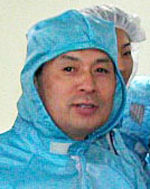- California Assembly OKs highest minimum wage in nation
- S. Korea unveils first graphic cigarette warnings
- US joins with South Korea, Japan in bid to deter North Korea
- LPGA golfer Chun In-gee finally back in action
- S. Korea won’t be top seed in final World Cup qualification round
- US men’s soccer misses 2nd straight Olympics
- US back on track in qualifying with 4-0 win over Guatemala
- High-intensity workout injuries spawn cottage industry
- CDC expands range of Zika mosquitoes into parts of Northeast
- Who knew? ‘The Walking Dead’ is helping families connect
Hwang wins U.S. patent for human stem cells
By Kim Tae-gyu
Scientist Hwang Woo-suk has been granted patents for human embryonic stem cells and the related technology in the United States, according to the U.S. Patent and Trademark Office (USPTO), Tuesday.
It marks the second time for the veterinarian to win patents outside Korea ― he received ones from the Canadian government in 2011 after several years of efforts in some 20 countries.
The U.S. patents on the cell line at issue, dubbed NT-1, are expected to give a fresh momentum to Hwang who is striving to resume his research on cloned human stem cells, which have great therapeutic potential.
“The USPTO acknowledged the technological edge of Hwang’s team, which means something in consideration of the global scientific leadership of the U.S.,” said Prof. Hyun Sang-hwan at Chungbuk National University, one of Hwang’s closest aides.
“Against this backdrop, I sincerely hope the government will allow Hwang to restart work on cloned human embryos. It’s a pity that a scientist with very advanced technology cannot work on them.”
Hwang and his lieutenants created NT-1 in 2003 and claimed that it was the world’s first stem cell batch extracted from cloned human embryos. Back then, it was much-touted breakthrough ― the illustrious journal Science featured it on its front cover in 2004.
But Hwang suffered setbacks as he was found to have doctored data from experiments on patient-specific stem cells, which were also printed by the peer-reviewed U.S. journal in 2005.
The authenticity of NT-1 also came under suspicions and some claimed that it was generated via asexual reproduction, not cloning, to further shrink the standing of the former Seoul National University professor.
In the end, Science retracted both papers.
Worse, Hwang had to go through court action because he was indicted for violating the Bioethics Law and embezzlement. The Supreme Court is currently reviewing his case.
He was cleared of some charges in his trial and at appeal. In addition, Hwang’s credence was not completely gone because the world’s first cloned dog that was born in 2005 and created by his team proved to be the real deal.
Arguing NT-1 is indeed a clone, Hwang has tried to resume his work on human stem cells but the government has yet to allow him.
An official at the Sooam Biotech Research Foundation, headed by Hwang, said that the U.S. patents would encourage other countries to issue reciprocal ones.













